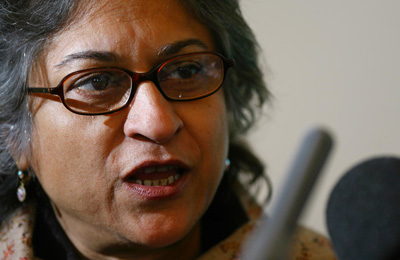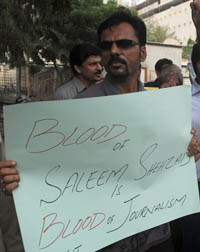Journalists in exile 2012
Crisis in East Africa Fifty-seven journalists fled their country in the past year, with Somalia sending the greatest number into exile. Journalists also fled Ethiopia, Eritrea, and Rwanda–mostly for Kenya and Uganda. Exiles in East Africa must grapple with poverty and fear. A CPJ special report by María Salazar-Ferro and Tom Rhodes
Brazil restates commitment to press freedom, UN plan
CPJ has received an encouraging letter from Ambassador Maria Luiza Ribeiro Viotti, Brazil’s permanent representative to the United Nations, affirming the country’s support for the UNESCO-led U.N. Plan of Action for Security of Journalists and the Issue of Impunity.
In Pakistan, UN human rights chief meets with Jahangir
U.N. High Commissioner for Human Rights Navi Pillay, in opening remarks at her press conference in Islamabad on Thursday, addressed a wide range of problems in Pakistan, including those faced by journalists. (The full statement is on the website of the Office of the High Commissioner for Human Rights.) What was especially gratifying was her…

EU, UN officials in Pakistan must make time for Jahangir
There is no better time than now for U.N. High Commissioner for Human Rights Navi Pillay and EU Foreign Policy Chief Catherine Ashton to step out of their tightly planned schedule of meetings in Pakistan and make a trip to the home of human rights activist Asma Jahangir.
Rising violence in Pakistan’s warring Baluchistan
The murder of a part-time journalist and a gunfire attack on the house of the president of the Turbat Press Club, both on May 28, underscore the nature of the escalating violence in Baluchistan. According to the Delhi-based Institute for Conflict Management, which monitors violence across South Asia, at least 10 people were killed in…

One year later: Saleem Shahzad’s case is buried
On May 21 this year, a military court convicted three Pakistani naval officers of negligence and dereliction of duty for their actions during an attack on the main naval airbase in the heart of Karachi on May 22, 2011. After the incident had ended, the military said 10 security guards were killed, two aircraft were…
Even by Pakistani standards, a terrible month for press
May has been a terrible month for journalists in Pakistan, a country that has ranked as the world’s deadliest place for the press for two consecutive years. Two journalists have been killed, two more shot and wounded, and one attacked while in police custody, all in less than a month, according to news reports.

No joke: Moves to squelch Pakistani media, again
With general elections approaching, the landscape is again bearing eerie resemblance to the final days of General Pervez Musharraf’s reign. In November 2007 he banned selected TV channels for 88 days to stifle what he saw as “irresponsible journalism.” Now, Pakistani electronic media might be chained again, this time for violating cultural and ethical values…